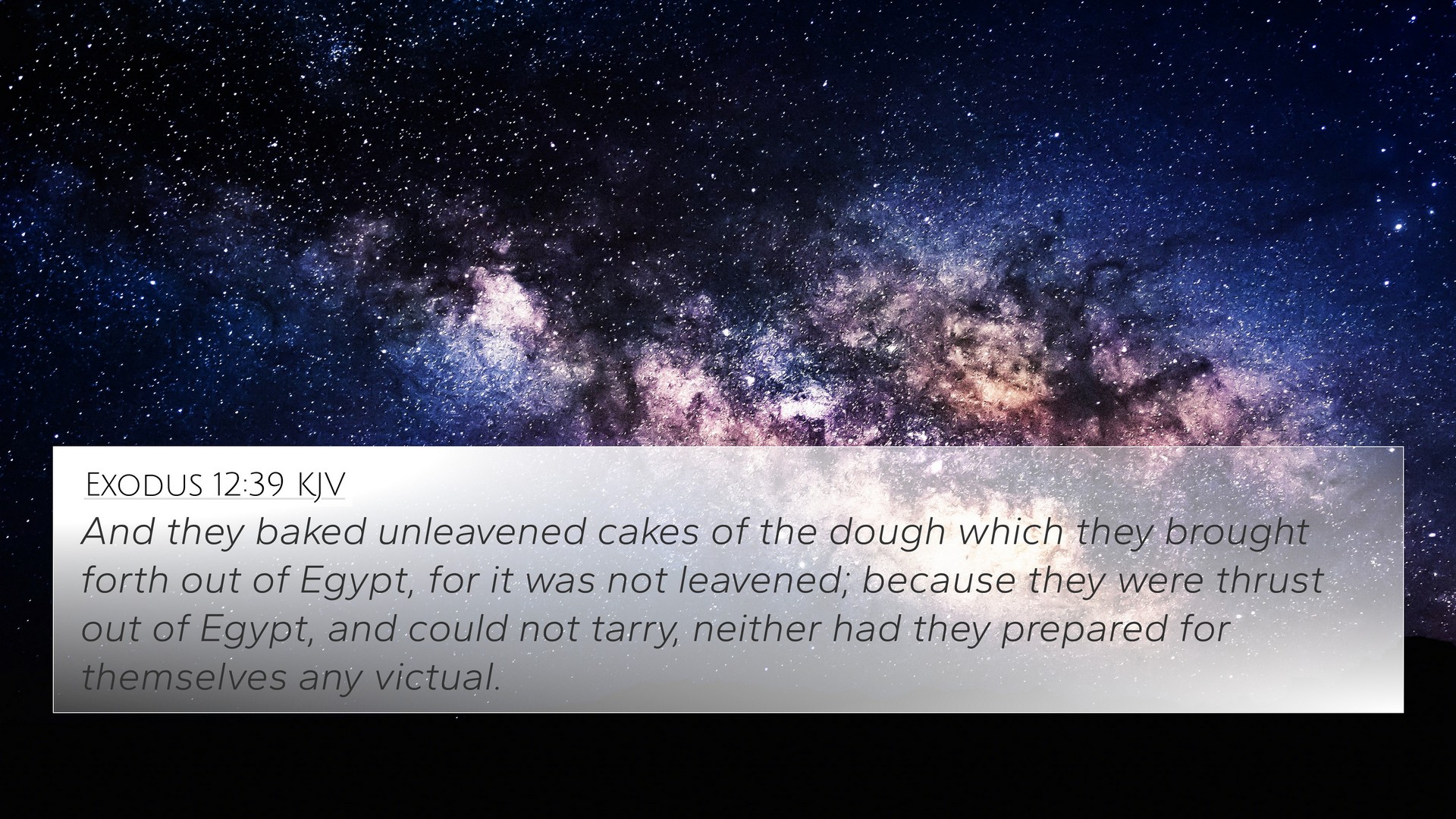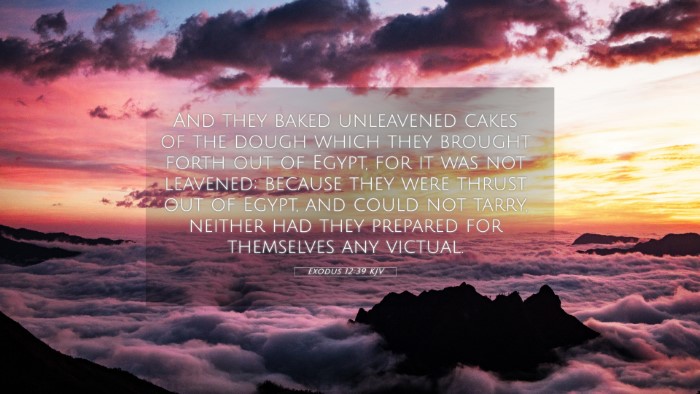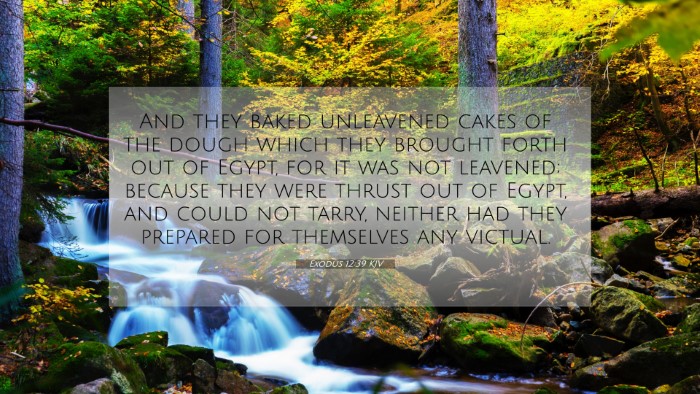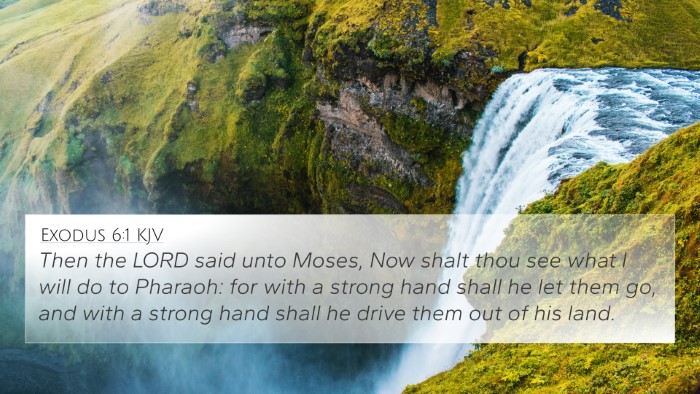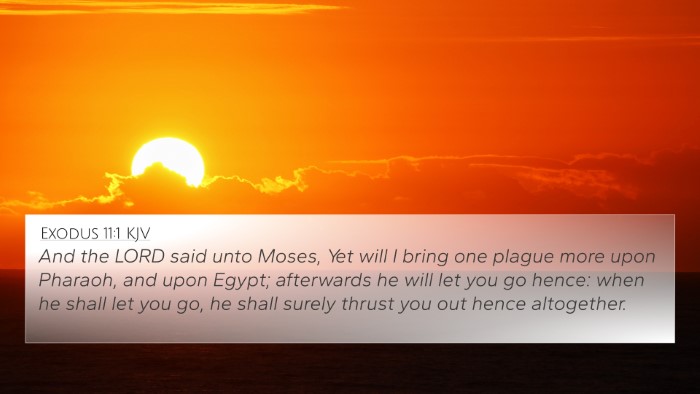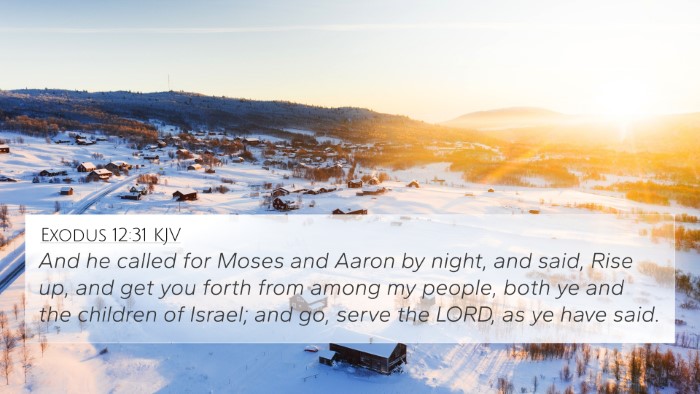Understanding Exodus 12:39
Verse Overview: Exodus 12:39 states, "And they baked unleavened cakes of the dough which they brought forth out of Egypt, for it was not leavened; because they were thrust out of Egypt, and could not tarry, neither had they prepared for themselves any victual." This verse occurs during the Exodus, highlighting the hasty departure of the Israelites from Egypt.
Meaning and Insights from Public Domain Commentaries
Matthew Henry's Commentary: According to Matthew Henry, this verse emphasizes the urgency and immediate nature of the Israelites' departure from Egypt. The unleavened bread symbolizes their haste and God’s deliverance from bondage. The lack of preparation signifies the suddenness of their escape; they were compelled to leave quickly, which demonstrated both their desperation and God's powerful intervention.
Albert Barnes' Notes: Barnes expands on the significance of unleavened bread, noting its symbolic meaning within biblical Judaism. It represents purity and the absence of corruption, both literally and spiritually, as leaven often symbolizes sin. The Israelites' quick exit without proper provisions highlights their faith in God's promise of liberation and the importance of obedience to divine instructions, as they prepared to embark on a journey towards the Promised Land.
Adam Clarke's Commentary: Clarke offers an interpretation of the preparation of unleavened bread's practicalities, underpinning how this action reflects obedience to God's command. His commentary suggests that this moment not only fulfills God’s directive but also establishes a lasting cultural and religious practice for Israel, underscoring their identity as a nation chosen by God.
Thematic Connections and Cross-References
This verse connects with several other biblical texts that elaborate on the themes of deliverance, obedience, and the symbolic meanings of bread and leaven. Here are some notable cross-references:
- Exodus 12:8: “And they shall eat the flesh in that night, roast with fire, and unleavened bread; and with bitter herbs they shall eat it.” – Reinforcing the consumption of unleavened bread during Passover.
- 1 Corinthians 5:7-8: “Purge out therefore the old leaven, that ye may be a new lump, as ye are unleavened.” – Relating the symbolism of leaven to sin and the new life in Christ.
- Leviticus 23:6: "And on the fifteenth day of the same month is the feast of unleavened bread unto the LORD." – Establishing a festival remembering the Exodus journey.
- Deuteronomy 16:3: "Thou shalt eat no leavened bread with it; seven days shalt thou eat unleavened bread therewith." – Continued emphasis on the practice of eating unleavened bread during the Feast of Unleavened Bread.
- Matthew 26:17: "Now the first day of the feast of unleavened bread the disciples came to Jesus, saying unto him, Where wilt thou that we prepare for thee to eat the passover?" – The connection to Jesus’ final Passover meal and its significance.
- John 6:35: “Jesus said unto them, I am the bread of life: he that cometh to me shall never hunger." – Jesus as the fulfillment of the bread symbolism.
- Galatians 5:9: “A little leaven leaveneth the whole lump.” - An echo of the warning against sin, highlighting the corrupting nature of unfettered disobedience.
Exploring Connections Between Bible Verses
The connections between Exodus 12:39 and other scriptures unveil a broader biblical narrative about God's faithfulness, the importance of obedience, and the significance of purity. These cross-references provide deep theological insights and enhance our understanding of God’s redemptive plan throughout scripture.
Bible Verse Parallels
By examining the parallels between Exodus 12:39 and related scriptures, one can see the consistency of God's message regarding deliverance and the transformation he offers to his people. Unleavened bread serves as a powerful symbol of new beginnings, echoing throughout both the Old and New Testaments.
Using Cross-References for Deeper Understanding
Engaging in cross-referencing Bible study methods not only enriches the study of this verse but also encourages believers to seek interconnected themes throughout the Bible. For those interested in a comprehensive exploration, utilizing tools for Bible cross-referencing, such as a bible concordance, can facilitate a more profound understanding of God's word.
Conclusion
Exodus 12:39 is more than a historical account; it is laden with spiritual significance and connections to the broader biblical narrative. By reflecting on the cross-references and utilizing a bible cross-reference guide, readers can uncover the intricate and divine web of scripture that intertwines God’s commands with the faithful response of His people.
In summary, the verse encapsulates a pivotal moment of divine deliverance while encouraging believers to maintain purity and obedience in their spiritual journey.
